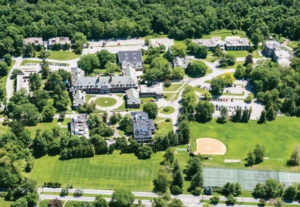The former Pace University campus in Briarcliff Manor has been used by educational institutions for more than a hundred years, according to a lawsuit, but cannot be used for that purpose by a Hasidic Jewish organization.
Instead of preserving the property’s historic role, Khal Torath Chaim of Rockland Inc. claims, the village “has chosen to protect a very different kind of historic character, one that perpetuates exclusion based on religious practices.”

Khal Torath Chaim (KTC) accused the village of religious discrimination, in a May 25 complaint filed in U.S. District Court, White Plains.
The 37-acre campus on Elm Road was first used in 1905 by Mrs. Dow’s School for Girls, according to the complaint. In became a junior college in 1933, was renamed as Briarcliff College in 1956 and was bought by Pace University in 1977.
The village granted Pace a special use permit to develop the campus and enable enrollment of up to 1,100 students.
Pace sold the property in 2017 to the Research Center on Natural Conservation Inc. for $17.35 million. The China-based nonprofit left the campus vacant, according to the complaint, and in 2021 KTC bought it for $11.75 million.
KTC, of Monsey, says it intends to use the campus as a place of worship. It leased the property to Yeshivath Viznitz Dkhal Torath Chaim (YV), a religious institution that offers undergraduate degrees in Talmudic and rabbinical studies.
YV planned to enroll about 250 students initially and about 350 in ten years.
The campus is in a residential zone that allows places of worship if the village grants a special exception permit or a zoning variance.
When KTC bought the property no land-use conditions restricted its use for worship, under a special use permit. But that status quickly changed, according to the complaint.
In June 2021, the village amended its regulations. Now a place of worship may not be permitted in the residential zone if the property has no access from a “collector road.”
The village’s comprehensive plan designates Elm Road as a collector road, according to the complaint. Federal Highway Administration standards define it has a collector road. The state Department of Transportation classifies parts of Elm Road as a collector road.
But the section of Elm Road that fronts the campus is not classified as a collector road by the state.
Within months of buying the property, KTC was no longer eligible for a special use permit that would allow a place of worship.
The change, the complaint states, “was an act of naked bigotry.”
Nonetheless, KTC and YV submitted an application for a special use permit. Last November, the village determined that the property was ineligible.
On April 23, the zoning board of appeals upheld that decision and said it had no authority to consider a zoning variance.
KTC and YV also contend that Briarcliff Manor used building code regulations to harass them.
Other than a fire alarm issue in 2018, the Research Center on Natural Conservation — a Chinese Communist front organization, according to the complaint — was issued no zoning or building code violations during the four-plus years it left the property vacant.
After KTC bought the property, the village cited numerous infractions, such as a broken lock and tardy snow removal.
This past May, the complaint states, the village proposed a penalty of $250 a day per violation, about $69,000 a month for nine infractions.
As long as a property has outstanding building code violations, according to the complaint, the village may not issue a special use permit.
“The village is plainly using excessive fines as another cudgel,” the complaint states, to force KTC and YV “to abandon their plans for a place of worship.”
They accused Briarcliff of religious discrimination under the First and Fourteenth Amendments of the Constitution, the Religious Land Use and Institutionalized Persons Act, the Fair Housing Act, and the New York State Constitution.
They are asking the court to stop the village from violating their rights and to award unspecified damages for economic losses resulting from unlawful conduct.
Village officials did not reply to emails asking for their side of the story.
KTC and YV are represented by White Plains attorneys Albert J. Pirro Jr. and Jeffrey A. Cohen.



















